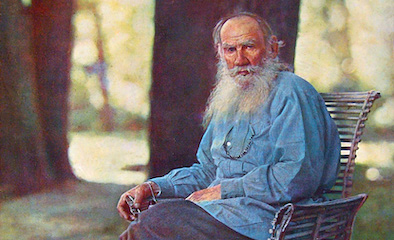
Leo Tolstoy (1828-1910; age 82). A Russian writer and philosopher. Count Lev Nikolayevich Tolstoy, known universally as Leo Tolstoy, is celebrated as one of the greatest novelists in world literature, renowned for his profound moral and philosophical insights. Luce Index™ score: 92.
Born on his family’s estate in the Tula Province of Russia, Tolstoy was the fourth of five children in an aristocratic family. Orphaned by age nine, he was raised by relatives and educated at home before briefly attending the University of Kazan, where he studied law and languages but left without a degree.
His early life was marked by a search for purpose, oscillating between hedonistic pursuits and introspective quests, experiences that later shaped his literary voice and ethical convictions.
Tolstoy’s literary career began in his twenties with the semi-autobiographical trilogy Childhood (1852), Boyhood (1854), and Youth (1857), which garnered attention for their psychological depth. His service in the Russian army during the Crimean War (1853-1856) inspired Sevastopol Sketches (1855), a work that showcased his realist style and critique of war’s brutality.
International acclaim arrived with War and Peace (1865-1867), an epic novel blending historical narrative with the lives of fictional families during the Napoleonic Wars. Spanning over 1,200 pages, it explores fate, free will, and human resilience. This was followed by Anna Karenina (1875-1877), a tragic tale of love, infidelity, and societal pressure, often cited as a pinnacle of realist fiction.
In his later years, Tolstoy underwent a spiritual crisis, rejecting his earlier wealth and status to embrace a radical Christian philosophy rooted in nonviolence, simplicity, and universal love. This shift birthed works like The Kingdom of God Is Within You (1894), influencing figures such as Mahatma Gandhi and Martin Luther King Jr.
He became a vocal advocate for pacifism, education reform, and the abolition of private property, often clashing with the Russian Orthodox Church and Tsarist authorities. His personal life grew ascetic; he renounced copyrights to his works, gave away much of his fortune, and lived as a peasant on his estate. Despite familial tensions—particularly with his wife, Sofya, over his ideals—his influence as a moral thinker expanded globally.
Tolstoy’s death in 1910 came after he returned home at age 82 seeking solitude but succumbing to pneumonia at a remote railway station. His legacy endures through his literary masterpieces and philosophical writings, which continue to provoke thought on human existence, morality, and justice. His family estate remains a cultural landmark, preserving his manuscripts and personal effects.